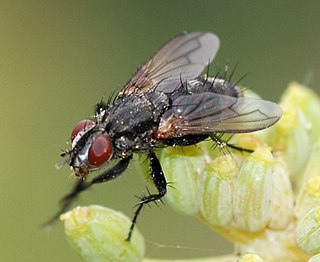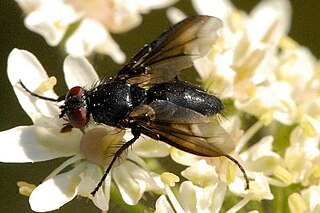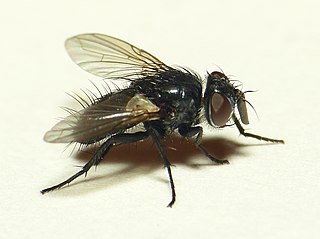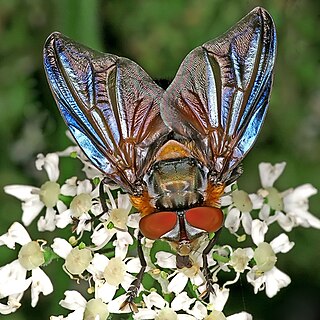
The Tachinidae are a large and variable family of true flies within the insect order Diptera, with more than 8,200 known species and many more to be discovered. Over 1,300 species have been described in North America alone. Insects in this family commonly are called tachinid flies or simply tachinids. As far as is known, they all are protelean parasitoids, or occasionally parasites, of arthropods, usually other insects. The family is known from many habitats in all zoogeographical regions and is especially diverse in South America.

Rhinophorinae is a subfamily of flies (Diptera), commonly known as Woodlouse Flies, found in all zoogeographic regions except Oceania, but mainly in the Palaearctic and Afrotropical regions.

Gymnosoma is a genus of flies in the family Tachinidae.
Hystricovoria is a genus of flies in the family Tachinidae.
Actinochaetopteryx is a genus of tachinid flies in the family Tachinidae. Its members occur in the Palaearctic, Oriental, and Australasian realms.
Prosheliomyia is a genus of bristle flies in the family Tachinidae.
Thryptodexia is a genus of flies in the family Tachinidae.

Voria is a genus of flies in the family Tachinidae.
Xanthopteromyia is a genus of flies in the family Tachinidae. This genus includes species such as Xanthopteromyia plumosa and Xanthopteromyia tegulata. These flies are diurnal and have a bilaterally symmetric body. They possess a tympanal organ as part of their auditory system and exhibit a diurnal behavioral circadian rhythm.
Actinochaetopteryx antennalis is a species of fly in the family Tachinidae.
Actinochaetopteryx aurifasciata is a species of fly in the family Tachinidae.

Voriini is a tribe of flies in the family Tachinidae. More junior homonyms exist of Wagneria than any other animal genus name.

Dexiinae is a subfamily of flies in the family Tachinidae.

Exoristinae is a subfamily of flies in the family Tachinidae. Most species are parasitoids of caterpillars.

Blondeliini is a tribe of parasitic flies in the family Tachinidae. Larvae are parasitoids of other insects, mostly beetles and caterpillars. Although nearly cosmopolitan, its greatest diversity is in the New World and especially in South America.

Eryciini is a tribe of flies in the family Tachinidae.

Phasiinae is a subfamily of flies in the family Tachinidae. Except for the small tribe Strongygastrini members of this subfamily attack only Heteroptera.
Gymnosoma philippinense is an Asian species of fly in the family Tachinidae.

Tachininae is a subfamily of flies in the family Tachinidae.
Prosheliomyia sibuyana is a species of fly in the family Tachinidae.









